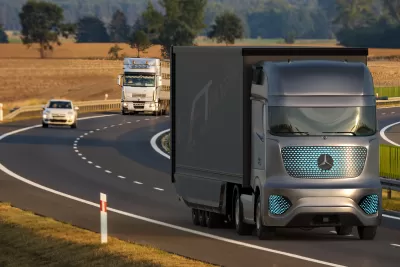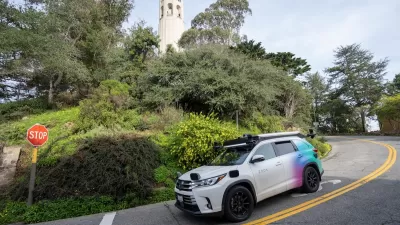A bill passed by the State Assembly and moving on to the Senate would require autonomous semi trucks to have a trained human operator in the vehicle.

According to an article by Maggie Angst in The Sacramento Bee, “California assembly members on Wednesday overwhelmingly voted to pass Assembly Bill 316, a proposal with bipartisan support to require a trained individual to sit behind the wheel of autonomous semitrucks and big rigs.”
Angst explains, “Current state law, established by the DMV, allows testing and deployment of driverless light-duty autonomous vehicles that weigh 10,000 pounds or less — stopping short of allowing the same for long-haul trucks and big rigs with autonomous capabilities.”
The bill’s author, Assemblywoman Cecilia Aguiar-Curry, D-Winters, said “we need to make sure that the roads are safe for the sake of our constituents and that jobs are safe for our truck drivers.” The bill is supported by truck drivers, who fear the loss of jobs to autonomous vehicles. “Supporters say the regulation would help protect people traveling on California roadways and support the livelihoods of truck drivers across the state.”
The move was criticized by industry leaders, who say the state should wait for federal guidance before deploying its own regulations on self-driving trucks. “Permitting the testing and deployment of autonomous trucks in California would help eliminate human errors, such as texting and driving and distraction, that contribute to traffic fatalities,” said Mufaddal Ezzy, senior director of state public affairs for software company Aurora.
FULL STORY: Lawmakers and Big Tech clash over the fate of self-driving semitrucks in California

Alabama: Trump Terminates Settlements for Black Communities Harmed By Raw Sewage
Trump deemed the landmark civil rights agreement “illegal DEI and environmental justice policy.”

Study: Maui’s Plan to Convert Vacation Rentals to Long-Term Housing Could Cause Nearly $1 Billion Economic Loss
The plan would reduce visitor accommodation by 25% resulting in 1,900 jobs lost.

Planetizen Federal Action Tracker
A weekly monitor of how Trump’s orders and actions are impacting planners and planning in America.

Waymo Gets Permission to Map SF’s Market Street
If allowed to operate on the traffic-restricted street, Waymo’s autonomous taxis would have a leg up over ride-hailing competitors — and counter the city’s efforts to grow bike and pedestrian on the thoroughfare.

Parklet Symposium Highlights the Success of Shared Spaces
Parklets got a boost during the Covid-19 pandemic, when the concept was translated to outdoor dining programs that offered restaurants a lifeline during the shutdown.

Federal Homelessness Agency Places Entire Staff on Leave
The U.S. Interagency Council on Homelessness is the only federal agency dedicated to preventing and ending homelessness.
Urban Design for Planners 1: Software Tools
This six-course series explores essential urban design concepts using open source software and equips planners with the tools they need to participate fully in the urban design process.
Planning for Universal Design
Learn the tools for implementing Universal Design in planning regulations.
Caltrans
Smith Gee Studio
Institute for Housing and Urban Development Studies (IHS)
City of Grandview
Harvard GSD Executive Education
Toledo-Lucas County Plan Commissions
Salt Lake City
NYU Wagner Graduate School of Public Service





























